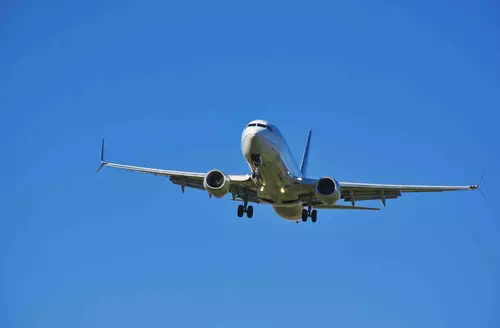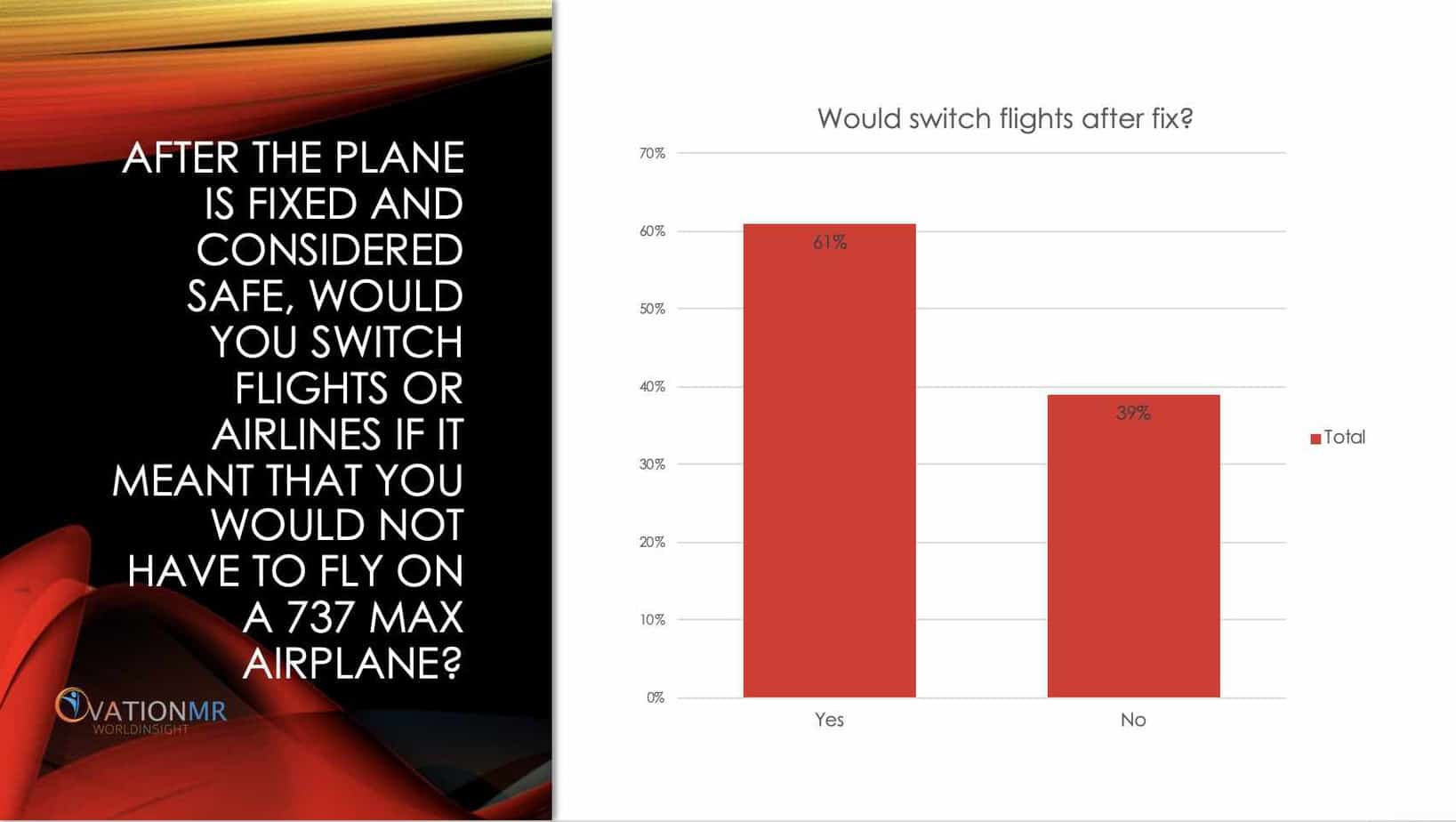Boeing Will Face A Skeptical Flying Public When It Fixes the 737 Max Jets

Travelers overwhelmingly believe the right decision was made to ground the 737 Max jets
Online Research suggests Boeing Will Face A Skeptical Flying Public When It Fixes the 737 Max Jets
Key Findings
- The vast majority (77%) of travelers have been following the 737 Max story at least a good amount.
- Nearly 9 in 10 (89%) think the jets were properly grounded, and most think they were grounded fast enough (59%)
- Nonetheless, there is concern that Boeing is too close to the FAA (60%) and 2 in 5 think the FAA did not do an adequate job when it initially certified the jet for flight.
- Travelers are divided on whether the 737 Max jets can be fixed with software updates (48%) and better training or if they should be scrapped (41%).
- Travelers are most apt to blame software (50%) for the problems with the 737 Max jets suggesting that software fixes may be enough to convince much of the flying public that the jet is safe.
- 2 in 3 would fly on a fixed version of the 737 Max jets, but a majority would choose another airline (61%) or pay 25% more (55%) to avoid them.
- Over 4 in 5 (82%) think Boeing should reimburse the airlines for the costs associated with the grounding.
| Mean | Median | |
| How many trips do you take via airplane each year? | 7.4 | 5 |
| How many business trips do you take by airplane each year? | 4.5 | 3 |
| How many personal trips do you take by airplane each year? | 4.7 | 4 |
Frequent travelers like to travel by airplane and car over trains and especially buses.
| How much do you like to travel via each of the following modes of transportation? | Airplane | Car | Train | Bus |
| Like a great deal | 57% | 52% | 31% | 16% |
| Like a good amount | 27% | 30% | 28% | 21% |
| Like some | 11% | 14% | 28% | 23% |
| Do not like very much | 3% | 3% | 8% | 25% |
| Do not like at all | 2% | 1% | 5% | 15% |
While all modes of transportation are viewed as safe, cars and buses are less likely to be seen as completely safe than planes and trains.
| How safe are each of the following modes of transportation? | Airplane | Train | Car | Bus |
| Completely safe | 42% | 40% | 30% | 27% |
| Mostly safe | 53% | 54% | 62% | 59% |
| Mostly unsafe | 4% | 6% | 7% | 12% |
| Completely unsafe | 1% | 0% | 1% | 3% |
With automobiles, travelers are most concerned that bad driving leads to accidents.
How concerned are you about each of the following causes of automobile accidents?
| Human error | Faulty maintenance | Poor vehicle design | Poor manufacturing |
Terrorism/ deliberate sabotage |
Lack of maintenance | Software design/ malfunction | |
| Extremely concerned | 53% | 32% | 23% | 29% | 29% | 28% | 23% |
| Very concerned | 26% | 27% | 27% | 22% | 21% | 31% | 24% |
| Somewhat concerned | 18% | 31% | 33% | 31% | 23% | 31% | 35% |
| Not concerned | 3% | 11% | 17% | 18% | 27% | 10% | 17% |
With airplanes, there is little differentiation as all of the concerns tested were extremely concerning to between 3 and 4 in 10 respondents.
How concerned are you about each of the following causes of airplane accidents?
| Lack of maintenance |
Terrorism/ deliberate sabotage |
Faulty maintenance | Software design/ malfunction | Pilot error | Poor airplane design | Poor manufacturing | |
| Extremely concerned | 38% | 37% | 36% | 34% | 34% | 33% | 30% |
| Very concerned | 29% | 22% | 27% | 30% | 21% | 25% | 29% |
| Somewhat concerned | 21% | 29% | 29% | 24% | 29% | 25% | 28% |
| Not concerned | 12% | 13% | 8% | 11% | 15% | 17% | 14% |
News of the 737 Max jets is top of mind for respondents.
| How much have you heard or read about the problems with the Boeing 737 Max jets? | Total |
| A great deal | 41% |
| A good amount | 36% |
| Some | 11% |
| Not very much | 8% |
| Nothing at all | 4% |
Software issues and poor airplane design are considered the top two causes of the crashes.
| What do you think caused the two crashes of the 737 Max jets? | Total |
| Software design/malfunction | 50% |
| Poor airplane design | 31% |
| Faulty maintenance | 29% |
| Poor manufacturing | 28% |
| Lack of maintenance | 24% |
| Pilot error | 21% |
| Terrorism/deliberate sabotage | 12% |
| Other | 6% |
Travelers overwhelmingly believe the right decision was made to ground the 737 Max jets.
| Do you think the authorities made the right decision to ground the 737 Max jets until the problem is solved? | Total |
| Yes | 89% |
| No | 7% |
| Don’t Know | 4% |
Nearly 3 in 5 think the FAA grounded the jets quickly enough.
| Do you think the FAA grounded the jets quickly enough in the United States? | Total |
| Yes, quickly enough | 59% |
| No, not quickly enough | 32% |
| Don’t Know | 9% |
There is a sharp divide among travelers as to whether the 737 Max jets need to be scrapped. A narrow plurality believes the 737 Max can be fixed with updated software and better pilot training.
| Which is closer to your view about the safety problems with the 737 Max jets? | Total |
| They can be fixed with updated software and better pilot training | 48% |
| The airplane must be scrapped due to fundamental problems with its design | 41% |
| Don’t Know | 11% |
Travelers are also mixed on whether the FAA did a thorough enough job in originally certifying the planes to fly.
| Do you think the FAA did a thorough enough job overseeing the certification of the 737 Max airplanes? | Total |
| Yes | 46% |
| No | 40% |
| Don’t Know | 14% |
A majority of travelers think Boeing has too much influence over the FAA.
| Do you think Boeing has too much influence over the FAA? | Total |
| Yes | 60% |
| No | 28% |
| Don’t Know | 12% |
2 in 3 would be willing to fly a 737 Max after its been fixed.
| Would you be willing to fly on a 737 Max jet after Boeing has fixed the problems with it? | Total |
| Yes | 66% |
| No | 34% |
The median length of time travelers think the fixes to the 737 Max jets should be tested is a quarter of the year.
| How long should Boeing be required to test fixes to the 737 Max jets before it can be flown as normal again? | Total |
| A day | 14% |
| A week | 11% |
| A month | 20% |
| A quarter | 20% |
| A year | 16% |
| Two years | 5% |
| More than two years | 6% |
| It should never be allowed to fly again | 7% |
Despite a willingness by 2 in 3 to fly a fixed 737 Max jet, 3 in 5 would switch flights to avoid flying on one. Nearly as many would pay 25% more to avoid flying on a 737 Max.
| After the plane is fixed and considered safe, would you switch flights or airlines if it meant that you would not have to fly on a 737 Max airplane? | Total |
| Yes | 61% |
| No | 39% |
| After the plane is fixed and considered safe, would you pay 25% more for your flight if it meant that you would not have to fly on a 737 Max airplane? | Total |
| Yes | 55% |
| No | 45% |
Travelers are more likely to trust the pilot’s union, the NTSB, FAA and the Airlines with their safety than Boeing, the Trump Administration or Congress.
How much do you trust each of the following to determine whether the fixes to the Boeing 737 Max make it safe to fly?
| The pilot’s union | The National Transportation Safety Board (NTSB) | The Federal Aviation Administration (FAA) | Airlines (e.g. American, United, Southwest) | The Trump Administration | Boeing | Congress | |
| Completely trust | 33% | 32% | 30% | 29% | 25% | 22% | 21% |
| Mostly trust | 34% | 33% | 30% | 36% | 22% | 30% | 23% |
| Somewhat trust | 22% | 26% | 29% | 26% | 16% | 28% | 28% |
| Do not trust | 11% | 9% | 10% | 9% | 37% | 20% | 28% |
Travelers think Boeing should reimburse the airlines for the loss of use of their existing jets.
| Should Boeing be required to reimburse airlines for not being able to use existing 737 Max jets? | Total |
| Yes | 82% |
| No | 18% |
Ovation MR conducted 221 interviews with flyers who take at least 4 trips by airplane each year with at least 2 of them being business trips.
Follow
OvationMR

Bart Borkosky
Author
Bart is Chief Research Officer at OvationMR and is responsible for Online Panel and Online Sample Data Quality. He also consults with clients on sampling design for various types of online research campaigns and research study design and reporting . Bart can be reached at Bart.Borkosky@ovationmr.com
To learn more about OvationMR Business Traveler Panel Solutions, Online Sampling, and Online methodologies for ensuring your success, you can visit Panel Quality & Recruitment or Download 2019 PanelBook or contact us at info@ovationmr.com



